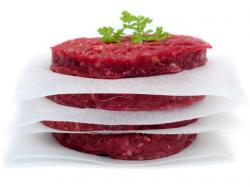FSIS Announces Public Meeting On Non-O157 E. Coli Implementation Plans
November 28, 2011 | 3 min to read

WASHINGTON – The U.S. Department of Agriculture's (USDA) Food Safety and Inspection Service (FSIS) announced today that it will hold a public meeting on Dec. 1, 2011, from 1 p.m. to 3 p.m. (EST), to discuss the implementation plans and methods for controlling non-O157 Shiga toxin-producing E. coli (STEC) in raw beef products. The Agency also announced the comment period, originally scheduled to end on Nov. 21, 2011, has been extended until Dec. 21, 2011.
The public teleconference will provide a forum for commenters to register formal comments on the implementation strategy FSIS expects to follow when FSIS begins verifying for the presence of the six new non-O157 Shiga-toxin producing E. coli on March 5, 2012.
This meeting will be available via teleconference, on a toll-free number. Pre-registration for this meeting is strongly suggested. To pre-register, access the FSIS website, at www.fsis.usda.gov/News/Meetings_&_Events/. Call-in information will be provided via e-mail to pre-registered participants. Anyone interested in making a public comment during the teleconference should indicate so on the registration form.
On Sept. 13, 2011, FSIS announced it was taking action to prohibit from entering commerce ground beef, or its precursors, found to contain the E. coli serogroups O26, O103, O45, O111, O121 and O145. Like E. coli O157:H7, these serogroups can cause severe illness and even death, and young children and the elderly are at highest risk. The Centers for Disease Control and Prevention identifies these particular serogroups of non-O157:H7 Shiga-toxin producing E. coli, or non-O157 STEC, as those responsible for the greatest numbers of non-O157 STEC illnesses, hospitalizations, and deaths in the United States.
Over the past two years, FSIS has announced a several new measures to safeguard the food supply, prevent foodborne illness, and improve consumers' knowledge about the food they eat. These initiatives support the three core principles developed by the President's Food Safety Working Group (FSWG): prioritizing prevention; strengthening surveillance and enforcement; and improving response and recovery. Some of these actions include:
- Performance standards for poultry establishments for continued reductions in the occurrence of pathogens. USDA expects the new standards to prevent as many as 25,000 foodborne illnesses annually. This includes a tougher performance standard for Salmonella and the first ever performance standard for Campylobacter.
- Zero tolerance policy for six Shiga toxin-producing E. coli (STEC) serogroups. Raw ground beef, its components, and tenderized steaks found to contain E. coli O26, O103, O45, O111, O121 or O145 will be prohibited from sale to consumers. USDA will launch a testing program to detect these dangerous pathogens and prevent them from reaching consumers.
- Test and hold policy that will significantly reduce consumer exposure to unsafe meat products, because products cannot be released into commerce until Agency test results for dangerous contaminants are known.
- Labeling proposals that provide better information to consumers about their food by requiring nutrition labels on single-ingredient raw meat and poultry products and by simplifying labeling language for raw meat and poultry products with added solutions that may not be apparent to the consumer.
- Public Health Information System, a modernized, comprehensive database about public health trends and food safety violations at the nearly 6,100 plants FSIS regulates.
As part of its multi-faceted approach to prevent foodborne illness, USDA also launched Food Safe Families, a consumer education campaign with the Ad Council, the Food and Drug Administration (FDA) and the Centers for Disease Control and Prevention (CDC). It is the first joint public service campaign to empower families to further reduce their risk of foodborne illness at home by checking their key food safety steps: clean, separate, cook, and chill. For more information, go to http://www.foodsafety.gov.
Please visit www.regulations.gov and follow the online instructions at that site for submitting comments. Mail, including floppy disks or CD-ROMs, and hand- or courier-delivered, should be sent to U.S. Department of Agriculture (USDA), FSIS, OPPD, RIMD, Docket Room, Patriots Plaza 3, 1400 Independence Avenue SW, 8-163A, Washington, D.C. 20250-3700. FSIS will announce this notice online through the FSIS website located at www.fsis.usda.gov/regulations_&_policies/Federal_Register_Notices/index.asp.
Source: USDA FSIS
